Ook beschikbaar in het Nederlands.
AI use rises to 62%, but strategic impact remains limited
Generative AI tools are currently used by 36% of marketing organisations, followed by integrated AI solutions (21%) and out-of-the-box AI within existing platforms (13%). Unsurprisingly, business departments favour the flexibility and speed of generative tools (47% adoption), while technical teams lean more towards integrated solutions (28%).
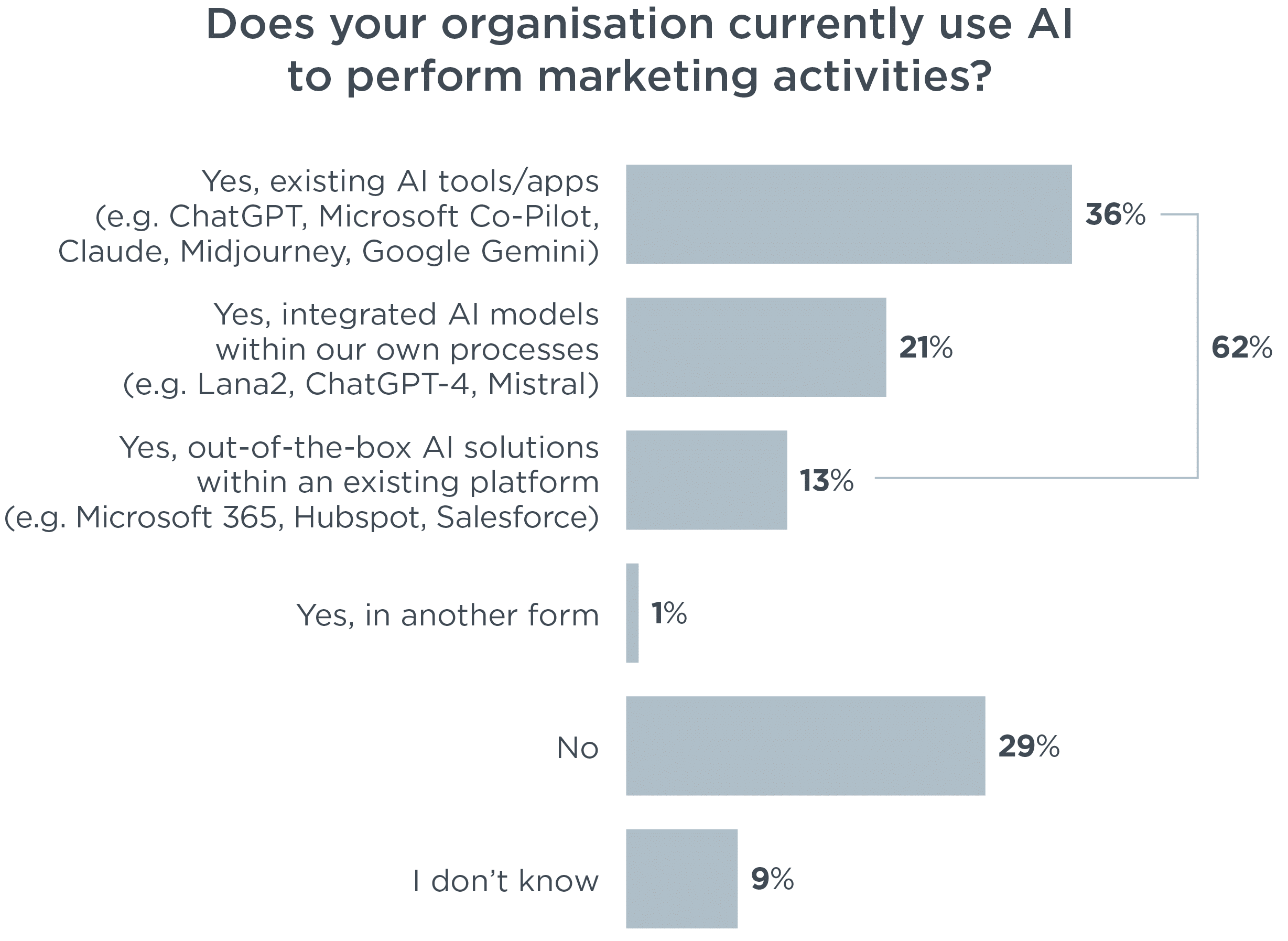
Expectations around AI in marketing are high, yet its actual application remains largely confined to relatively simple use cases. AI is used by 40% of organisations for content creation, followed by ideation (29%) and data analysis (23%) — see also Chart 5. Strikingly, applications with a deeper impact on marketing strategy remain largely untapped. Only 15% use AI for personalised campaigns, and just 9% are experimenting with autonomous AI agents. This highlights that AI is, for now, primarily a supporting technology rather than one that is truly integrated into the core of marketing operations.
“The rise of generative AI felt like a leap forward in time for me as a marketer. Fully personalised campaigns suddenly came within reach. Yet, DDMO 2025 shows that only 15% of organisations are already using AI for personalisation. The technology exists, but its application is lagging behind.
At KPN’s Business Market division, I see the potential every day. Marketing teams are actively experimenting with generative AI at an operational level. The challenge now is to make AI truly strategic. Not through isolated experiments, but by integrating it into processes — from designing customer journeys to decision-making.
And this goes beyond content creation. The real power lies in predictive AI: who receives which message, and what is the most relevant form of personalisation? The teams that succeed will not simply do more with the technology, but will use it to do what they do better — by combining tools with governance and vision. This requires ownership, reliable data, and a culture where you are willing to learn and let go of what no longer works. That’s how AI becomes an accelerator of impact, not just of output.”
— Brenda van den Berg, DDMA committee member for AI and Marketing Manager for the Business Market at KPN.
Lack of knowledge, capacity and data quality hinder AI adoption
Organisations that have not (yet) adopted AI cite the main reasons as: unsuitability for their sector (27%), lack of knowledge (26%), and insufficient capacity (18%). Notably, only 14% of organisations regard AI knowledge as a core competence within marketing roles. This points to a gap between current skill profiles and the future demands of the discipline — and, as a result, organisations may unintentionally be limiting their own pace of adoption.
At the same time, a lack of capacity is often mentioned as a barrier, even though AI could help free up resources by automating repetitive tasks. Organisations appear to be focusing on short-term challenges, leaving opportunities for structural improvement untapped. The question is how well they are prepared for the inevitable impact AI will have.
Almost one in six organisations (16%) say they do not intend to use AI more frequently in the coming year, mainly due to capacity constraints (25%) and lack of knowledge (23%). This suggests not unwillingness, but an inability to act. As a result, the gap between frontrunners and laggards risks widening — with some organisations lacking the means to invest in technologies that could, in time, make them more efficient.
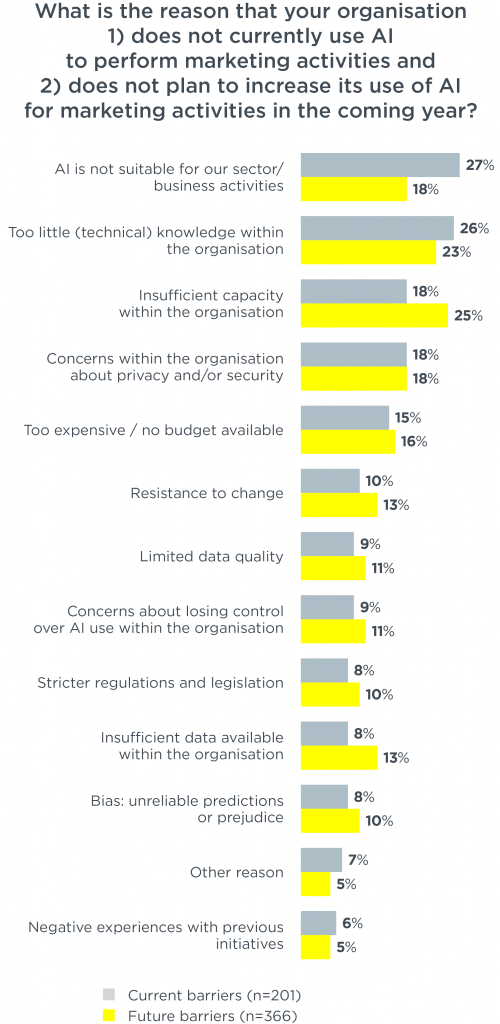
“Technological developments are evolving so rapidly that many organisations struggle to keep pace. That is a risk, especially if you aspire to become a truly digital business. Progress comes not from waiting, but from doing: by experimenting, learning, and adjusting along the way.
So what does it take to accelerate AI adoption? At KPN, we have learned a great deal over the past five years, enabling us to drive impact with new AI solutions more quickly and effectively. Our key takeaways? Start with a well-chosen AI project, ideally one where the KPIs are closely aligned with the organisation’s strategic goals. Begin small, with a core team of motivated colleagues. The real acceleration lies in the collaboration between tech and business. Involve stakeholders early, and build trust through transparency by sharing demos, updates, and clear communication. Doubts will arise. Take them seriously and support your case with data.
Aim for an early win. A small success sparks curiosity and builds momentum. AI will never predict with 100 percent accuracy, and tolerance for mistakes tends to be low. But the current way of working is not perfect either. Offering that perspective opens up the conversation and the door to further AI development. The key is not to block progress, but to get started.”
— Ruud Gelissen, Director AI Consumer Market at KPN
The role of skills in successful AI adoption
Implementing AI requires more than just technology: it’s about behaviour and the willingness to adapt ways of working. In practice, a divide often emerges: a small group of pioneers experiments, while the majority sticks to familiar routines. Organisations that truly want to integrate AI invest in collective learning — not just in tools. What’s more, from 2 February 2025, AI literacy will be a legal requirement. (See the DDMA AI Literacy Roadmap for everything you need to meet this obligation.)
Yet many organisations still lack a structured approach. One in three (33%) do nothing to develop AI competences and have no plans to do so; for smaller organisations (1–10 employees), this rises to 54%. The larger the organisation, the more attention is given to skills development.
Organisations that are making real progress combine three elements: creating awareness through training, providing room for experimentation, and supporting concrete applications. This combination has proven effective in driving behavioural change and embedding AI more broadly within the organisation.
Nearly one in five organisations (18% — and 42% among DDMA members) actively provide training, while 29% (DDMA members: 45%) support self-selected training. Among data-driven organisations, such as those in the DDMA network, these figures are even higher — pointing to a growing awareness of the importance of investing in AI knowledge.
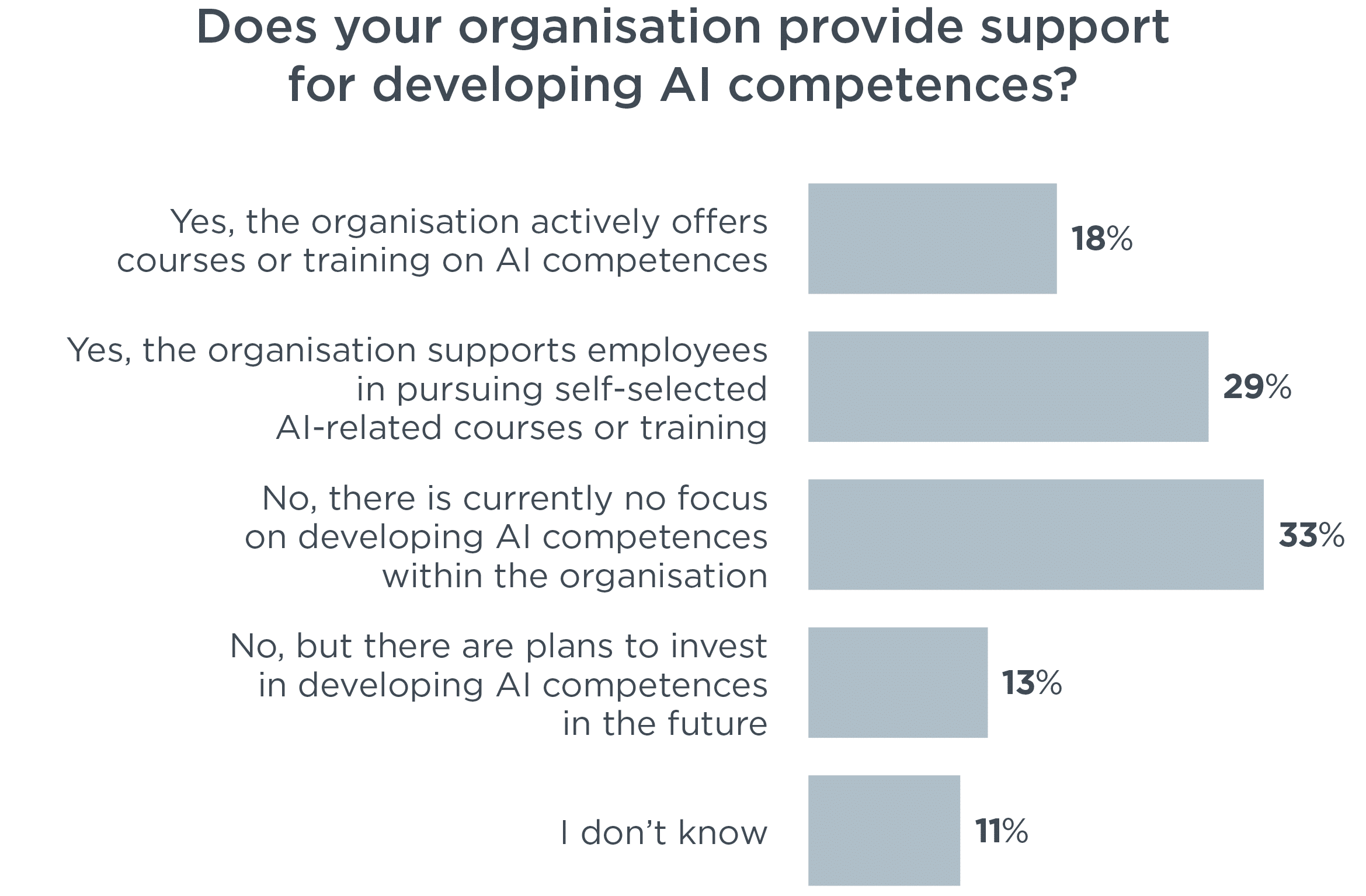
“ABN AMRO is one of the frontrunners among the major banks when it comes to GenAI. By integrating GenAI into our processes and services, we are making the customer experience more personal and accessible, while strengthening our risk management with reliable data.
This is how we put our bank-wide strategy into practice. We place strong emphasis on developing competences: all colleagues have access to ABN Amro GPT, a secure version of ChatGPT; we offer e-learnings; and there’s a Kickstarter programme to learn how to apply GenAI in daily work in just 90 minutes.”
— Hiek van der Scheer, Chief Data & Analytics Officer at ABN Amro
AI policy and governance on the rise: opportunities for growth
AI governance within marketing is fragmented in many organisations. Management (28%), IT (27%) and Marketing (21%) most often take the lead. DDMA members are more likely to choose a centralised approach: 41% have an AI lead or central AI working group, compared to 19% in the broader sector.
Through AI policies, organisations define how the technology can be applied responsibly, providing guidance on data use, risk management and ethics. Although 54% of organisations have now established an AI policy, the agreements are often limited. Only 29% have guidelines covering both internal and external use.
Smaller organisations in particular are falling behind: 70% lack any AI policy, compared with just 18% of corporates. This shows that formal oversight of AI use is largely found in larger organisations, while smaller players are lagging.
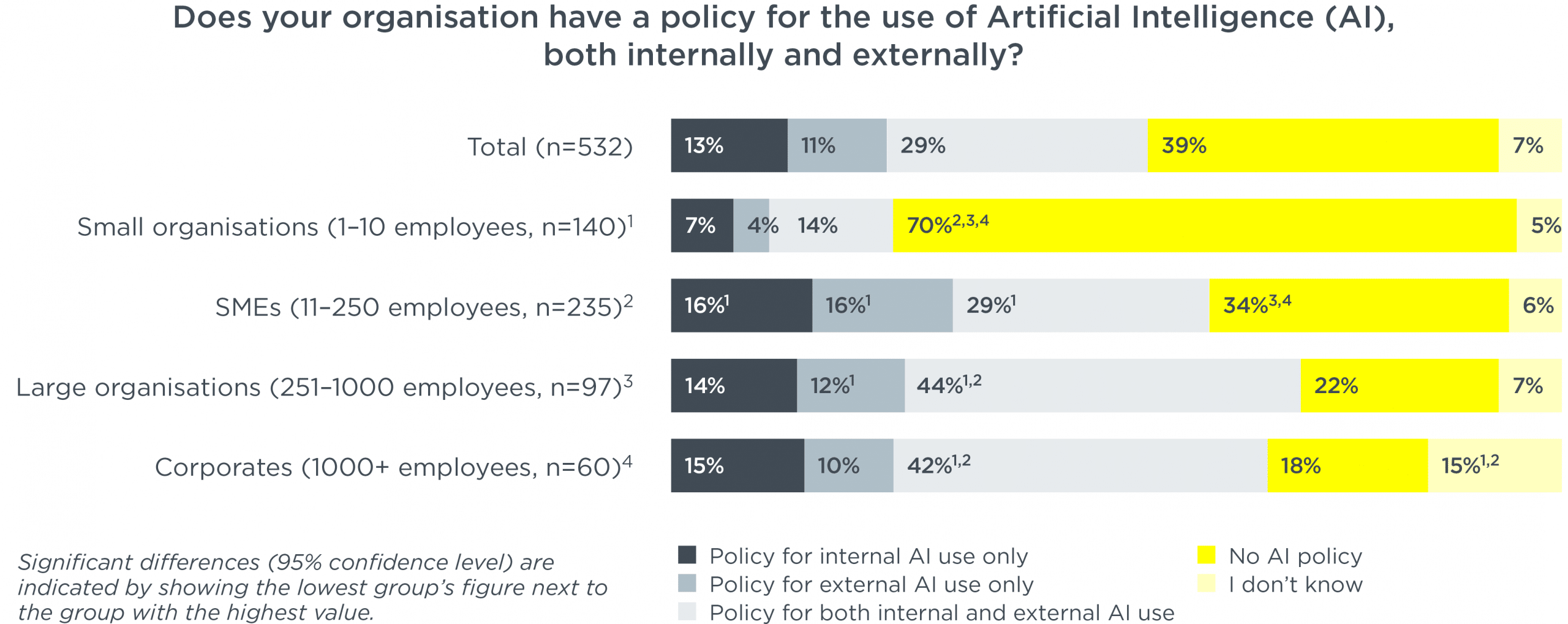
“At PostNL, we believe the true power of AI is only realised when people are placed at the centre. That’s why we established an AI Centre of Excellence, to help employees not only understand AI, but also apply it meaningfully in their daily work. We invest in building AI literacy through training, hands-on support for proof-of-concepts, and by encouraging experimentation within teams. This allows employees to discover for themselves how AI can add value to their work.
AI is not the exclusive domain of IT or data science. In fact, true acceleration comes from involving everyone in the organisation from the very beginning. This creates ownership, engagement, and momentum. The AI Centre of Excellence plays a central role in this process: it safeguards quality, promotes collaboration, and ensures that knowledge and technology are widely accessible across the organisation. By building a scalable and responsible AI environment, we ensure that AI solutions are not only innovative, but also safe, ethical, and relevant to the organisation as a whole.”
— Milou Verhij, Head Center of Excellence at PostNL
The future of AI in marketing: 3 in 4 want to do more
Interest in AI in marketing is growing: 72% of organisations (31% of them certain) are considering increasing their use of AI for marketing activities in the coming year. The focus remains on content creation (35%) and ideation (29%), but also includes predictive analytics (25%), SEO optimisation (22%), and virtual assistants (21%).
Smaller organisations (1–10 employees) are somewhat more hesitant: 19% are already certain they will use AI more frequently next year, compared to 42% of corporates. Larger organisations also see more potential in chatbots/voice bots and autonomous AI agents — systems that can make independent decisions — although the expected uptake here remains limited.
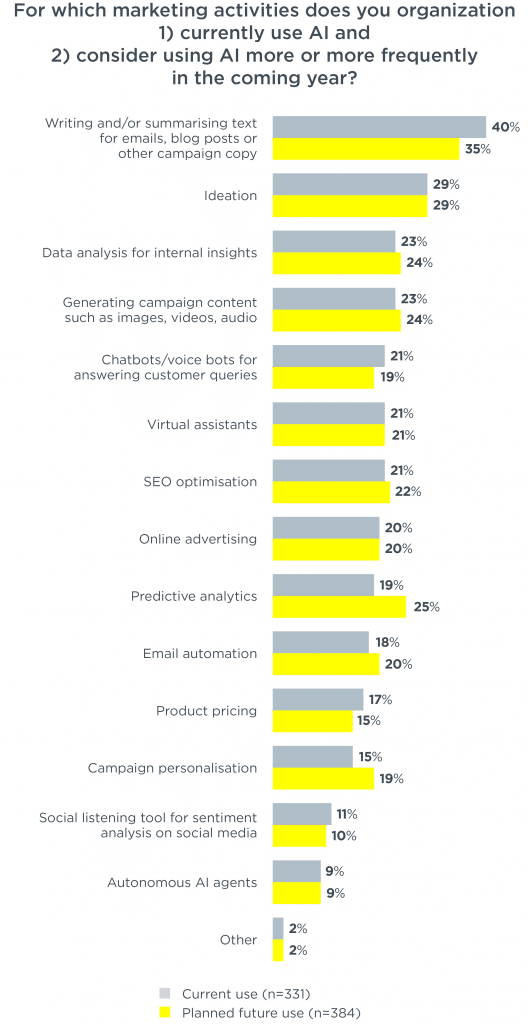
* In 2025, the question regarding the application of AI to marketing activities was different from that in 2024
AI-first: the new standard in tech companies
Major technology firms are visibly shifting towards an AI-first approach. Employees are expected to actively integrate AI tools into their daily work.
For example, Shopify has a policy of only hiring new employees for roles that cannot be performed by AI. Duolingo follows a similar path. At Microsoft, 20–30% of code is now generated with AI; Meta aims to increase that share to 50% in the coming year.
These examples illustrate how AI use is increasingly embedded in policies and KPIs, rather than left to individual preference. Large tech companies believe that structural integration of AI contributes to consistency and strategic value. In this way, AI is evolving from experiment to a measurable factor in operations and decision-making.
About the Data-Driven Marketing Survey (DDMO) 2025
The Data-Driven Marketing Survey (DDMO) is an independent initiative by DDMA and the DDMA Committee on Data, Decision & Engagement. It provides an annual overview of how the Dutch marketing sector uses data and technology, with a focus on opportunities, challenges, and ethical considerations.
DDMO 2025 is based on responses from 532 professionals working in the Dutch marketing sector (2024: n=520), recruited via the GfK panel. All respondents confirmed that their work is predominantly marketing-related. In addition, 60 respondents from the DDMA membership participated. The reported results are based on the research group (n=532), unless stated otherwise.
Further information
The DDMO 2025 summary was published on 3 July: “DDMO 2025: AI redefines marketing function, sector matures amid growing pains.” A deep dive into the sector’s data-driven adolescent phase will follow late August on www.ddma.nl. For questions or press inquiries, please email info@ddma.nl.
Ook interessant

Podcast Shaping the Future: “Zonder experimenteren vaar je blind”

DDMA zoekt (Junior) Legal Counsel




